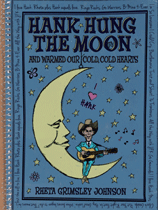Who knew that Al Green can write as well as he can sing and preach? Or that Hank Williams could heal so many broken hearts? Or that the Jimi Hendrix experience once opened for Davy Jones and the Monkees?
I learned all of these things this week because of a confluence of musical forces.
One of them was an advance copy of a new book by Rheta Grimsley Johnson, former columnist for The Commercial Appeal. “Hank Hung the Moon, and Warmed Our Cold, Cold Hearts” is not a biography of Hank Williams but more of a musical memoir. The Alabama-born singer has been a comfort and inspiration to the Alabama-born writer all her life, helping her through the awkward phases of childhood, hundreds of long lonely drives as a columnist, and the sudden death of her second husband in 2009. The book is published by NewSouth Books and should be out soon.
Changing genres, Davy Jones, the cutest of the Monkees, died this week at the age of 66. The tidbit about Jimi Hendrix was in one of the obits. If you think about it, it’s pretty funny that Jimi Hendrix opened for anyone, especially some goofy white boys. The Monkees were the sixties answer to “American Idol” — a made-for-television band modeled, loosely, after the Beatles. Their big hits came out in 1967, the year I graduated from high school, and you could not possibly avoid them. Which brings me to . . .
Class reunions. If you are 27 or over you probably have gotten an invitation to one or two of these. Now they come supercharged by Facebook and e-mail, although I wonder if many in my demographic are paying attention. The Class of 1967 is having a 45th reunion. A tenth, sure, a 25th, maybe, a 50th if you’re lucky, but a 45th?
I guess it’s fitting because in a lot of ways we were the Class of In Between.
We were the first class of freshmen in the “new” East Grand Rapids High School. Newbies in a new building. You can’t get much lower than that. The old high school, still standing, reeked of history and tradition. The “new” one, which will be 50 years old next year, reeked of newness, Clearasil, and Canoe.
The touchstone of our freshman year was the assassination of President Kennedy on a Thursday afternoon in November. The see-you-later after graduation was the riots in Detroit in the Summer of ’67. We were products of the fifties but took the full brunt of the sixties.
The significance of those events was not lost on us, even then. But the truth is, my mind was probably preoccupied at the time with impure thoughts of some of my female classmates or the first day of basketball practice the next day. In sports as in algebra, the schedule proceeded as normal. Friday afternoon, as the nation mourned, the boys who would disappoint our classmates and coaches for the next four years took the floor. The athletic production line that had churned out so many champions pretty much shut down on the Class of ’67 and we managed to break winning streaks, start losing streaks, and set records for ineptitude. We even lost in sports like tennis and swimming as other schools and suburbs discovered the wonders of country clubs, affluence, courts with nets, and indoor swimming pools. Girls had three sports options: cheerleading, water ballet, or not being in cheerleading or water ballet. But times changed. Thanks to them, the school now boasts hundreds of championships.
We lived in an unannexed bedroom community not unlike present-day Germantown or Collierville, minus the black students. The Grand Rapids ghetto was a few miles from my house but might as well have been another planet for all I knew about it. Only last year, when someone loaned me “Thin Ice,” a book of coming-of-age stories about growing up in Grand Rapids, did I learn that one of its residents was a future Memphian and musical legend.
Al Greene, as he spelled his name then, moved from Forrest City, Arkansas to Michigan when he was a boy and lived there for about ten years. His story, “Half a Chance to Prove Myself,” is the best one in a very strong collection, for my money. He took and gave some beatings, learned that his gift was for singing not fighting, formed a group called Al Greene and the Creations, went solo, dropped the final “e” and moved to Memphis to record with Willie Mitchell’s band in 1968.
His autobiography is called “Take Me To the River.” Get it, or get “Thin Ice.” He was saved, as he tells it, by his own toughness, a caring teacher or two, and a local church. And, of course, that voice.

